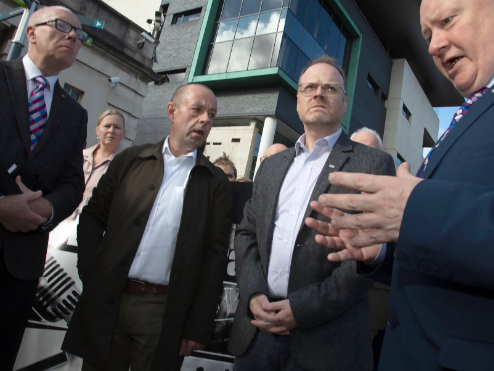
I spent a day this month with Trevor Birney and Barry McCaffrey, two Northern Irish journalists currently on police bail as a result of their work.
At the end of August last year, armed police officers swooped on their homes to confiscate computers and arrest the pair.
Their case is deeply concerning and I made a short film to highlight their plight and its implications for press freedom.
In it, McCaffrey says: “Unless there is protection for press freedom, they will come for other people, they will come for other journalists”.
Using the vague metrics of shares, retweets and favourable comments, I felt satisfied that I had done my bit to bring their case to wider attention.
One friend left an interesting comment on social media, however. “It’s all very Northern Irish, isn’t it?”
I was pondering this when I received word that my Turkish friend, Ayşe Düzkan is starting an 18-month jail sentence as a result of her journalism.
It is a chilling reminder that there is a continuum that starts with denigrating journalists and abusing authority to hinder their reporting and ends with Jamal Khashoggi’s grotesque, extra-judicial execution in his own country’s embassy.
I met Ayşe when I delivered collective bargaining training for journalists’ unions in the Balkans. We struck up a friendship and have met since when work has taken me to Istanbul where she lives.
During a long career in journalism, she has covered conflict zones as well as fashion and culture, written for feminist magazines and worked as an editor.
We have a mutual interest in music, although I don’t share her penchant for heavy metal.
She is also on the left of Turkish politics and is a member of the executive of the most radical journalists’ union in that country DISK Press-Work.
Turkey is a country that is as bitterly divided as it can be baffling. As well as right and left, there is a chasm between secularists and various shades of Islamists. A significant separatist movement exists among Kurds, elements of which are militarised.
And there are the shifting sands of alliances between groups. Turkey’s President Erdoğan has made alliances with moderate Islamists and Kurdish groups early in his administration. Both are today his bitter enemies.
What has been constant, certainly since the attempted coup of 2016, is Erdoğan’s antipathy to a free press. His campaign to control the media has taken various forms.
Some critical media groups have been economically targeted so that, as they started to struggle financially, government allies could take them over at knock-down prices.
Around 180 journalists have been jailed and a raft of newspapers have been declared “illegal” and banned. There are also severe restrictions on the internet in Turkey. At a basic level, Wikipedia is inaccessible.
Against this backdrop, Ayşe and her union colleagues decided that they had to take a stand. For one day, five of them announced on the masthead that they were executive editors of Özgür Gündem (Free Agenda).
The paper’s editorial stance is pro-Kurdish rights. It has also been quick to try and accurately report insurgent military action – something that Turkey’s official media has downplayed.
The paper has been the object of Government harassment since its inception – despite loud protests from international groups such as the Committee To Protect Journalists and Reporters Without Borders.
Reaction to Ayşe and her colleagues’ solidarity appearance on the masthead was swift and, from a UK perspective at least, shocking.
The five were arrested and then subjected to a grinding legal process, the result of which is a three-years-and-nine-months sentence for one of them and 18 months behind bars for the rest. The paper itself has subsequently been declared illegal.
Such a treatment of journalists would shame a Latin American Junta. Turkey, however, is a prosperous modern country, a democracy and a candidate for EU membership. That media workers are subjected to such a regime of judicial aggression is chilling.
Nor does it take much effort to draw a line between the treatment meted out to Trevor Birney and Barry McCaffrey (pictured, centre right and centre left).
I doubt if they will ever be charged with offences at all. Everything about their case looks like an elaborate and very expensive theatrical exercise. But it is a continuum.
That an English police force, Durham, is willing to be complicit in such a bizarre performance shows how uncomfortable authority can be when it is the subject of criticism and how easily irritation spills over into abuse of power.
I salute Ayşe for her bravery as much as I fear for her welfare. My only experience of Turkish jails comes from the cinema. I can only hope that things have improved since Midnight Express (Alan Parker’s 1978 film).
But to find that someone who, by chance, I am friends with is about to start a draconian jail sentence for such a ridiculous non-offence, makes me think that my efforts on behalf of my Northern Irish colleagues are insufficient.
Edmund Burke’s famous dictum about evil flourishing when good men do nothing has never seemed more true.
Picture: Seamus Dooley
Email pged@pressgazette.co.uk to point out mistakes, provide story tips or send in a letter for publication on our "Letters Page" blog
